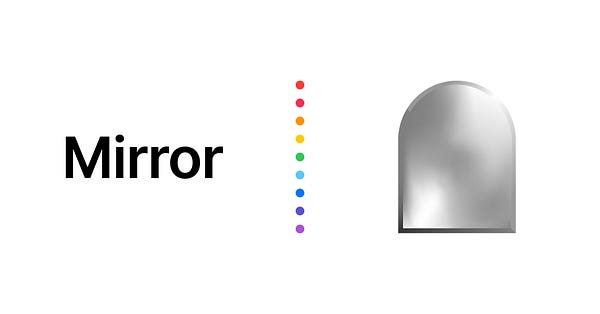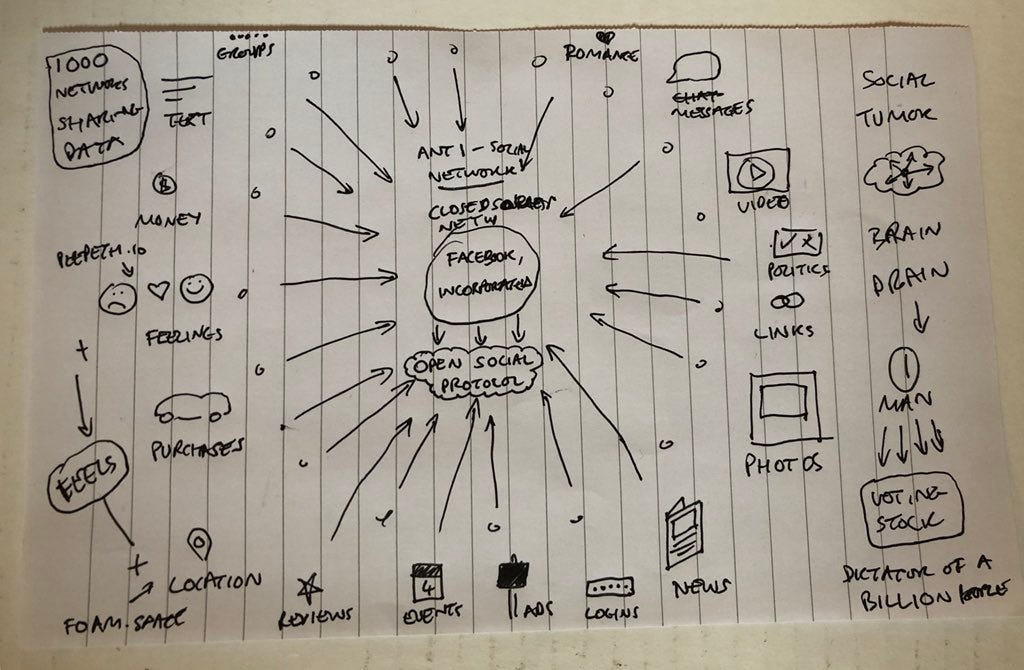Social Networks & Sociable Protocols
How will people interact with each other over the Internet in the future?
I want to carve out a space in your mind for something that I think is coming soon: sociable protocols
Social Protocols - These were built at the beginning of the Internet. They allowed individuals who knew each others’ contact details to contact each other. Groups could form over email threads (Simple Mail Transfer Protocol) and IRC Channels (Internet Relay Chat). These protocols were really powerful for communication but they were unable to store important state like images, comments, replies and social context.
Social Networks - MySpace, Friendster, Facebook and LinkedIn lead the charge to map out people’s relationships on the Internet. They used the best technology that they had access to at the time: a Delaware Corporation and racks of privately owned servers. This concentrated enormous amounts of power and capital in the hands of a few Silicon Valley CEOs and their moderation teams.
Sociable Networks - When I enter a room on Clubhouse, laugh at TikTok video, reply to someone on Twitter, or watch someone share some knowledge on YouTube, I find a different part of my brain is lighting up. It is a sociable interaction where I am connecting with someone outside my circles. I think of the products that are produced by these companies as encouraging new kinds of socialising.
What is Sociable Protocol?
I think the Internet and the people of the planet are ready for sociable protocols that are not controlled by people who look like me in Silicon Valley. We need to swing the pendulum away from top-down digital dictatorships that are incorporated in Delaware.

To me, a Sociable Protocol must meet a few tests:
Permanent data storage - We cannot keep locating our social connections and memories inside servers controlled by for-profit companies. Companies emerged to plug the gaps in the Internet that the technologists simply could not fill. The connections between people should be controlled by the people, not by companies. That information is part of our social fabric and when we define those relationships inside for-profit companies, it gets abused. The sociable protocol must re-capture our social data in new ways.

Un-censorable developer access - Anyone with an idea should be able to interact with the data and connections with people’s permission. Developers must know that they can build a product that uses this protocol without fear of being removed.


Community-controlled censorship - I believe censorship should happen at the app layer, not the protocol layer. You can email child porn but Gmail will not show it to you. You might want Donald Trump removed, but I want to hear from the sitting President. People must be able to choose apps that tap into a common protocol with different censorship levels depending on different communities’ desires.

Open source feed algorithms - The systems that control what we see on our feeds have a profound impact on our mental health and understanding of the world. A sociable protocol would allow developers to offer new kinds of algorithms to communities who want to see the world in different ways. I am meticulous about the apps I install on my phone and use every day—I want to do the same for my algorithms.


Why do people care?
So many people’s livelihood depend on social networks today. They are the top of the funnel for the products we buy, new job opportunities, and audiences we can build.

TikTok’s rise shows us that the battle for better attention algorithms is still being fought. Clubhouse’s rise shows us that new ways of meeting new people can always emerge. The ground is ripe for experimentation in sociable software.
The political backdrop is also really present in people’s minds. Whatever you think about Trump, you have to think carefully about his removal from Twitter.

Twitter can remove everything you have built overnight. For example: one of my favourite accounts run by Jack Butcher—the @value handle—was removed for no discernible reason. He spent years building up an audience around it.
What will the hook be?
I signed up for Facebook because a friend tagged me in some photos he took of me. That was the hook for social networks for a very long time: your friends can see you.
What will be the thing that hooks people into sociable protocols? I don’t have the answer but here are a few ideas about how the flywheel might start turning.

What we see with NFTs is a return of creative scarcity and status emerging around ownership. It feels like a core component to the trend is the ability to make money from perceived taste.
Earning is way more powerful than getting likes. If those two elements can be interwoven into the fabric of a network, it will mean people can make money from their time in new ways. Today, the bluntest tool in social is where you build an audience and then try to sell to it. We are going to see so many new experiments around paying people for content creation, sophisticated moderation and other forms of Internet work.
Distributed Autonomous Organisations (DAOs) are starting to pay people a lot of money for work they submit to the systems they represent. Over time, you can imagine people’s working relationships being defined by their contributions to these systems.
It really feels like something has to emerge with crypto principles from the ground up. It cannot come from a typical startup team who has no appreciation for the nuances of these protocols.

What will not work in this space?
I find it helps to try and define what I think will not happen to free up mental space for stuff that might. It helps me think about the kinds of things I do want to see and why.
There have been a few crude attempts at building social networks that are slapped onto a blockchain. They feel like the worst of all worlds: bad products with none of the network effects of a protocol.

I do not believe this will come from a team of wealthy engineers at Twitter through their Bluesky initiative. New technological revolutions come from young teams with nothing to lose and a totally new perspective.

The right project will likely create an enormous network effect with lots of developers using it to share common state among social apps.
Who is working in this space?
I am paying close attention to Zora, Foundation, Showtime, Mirror and a few other teams that have not announced their projects yet. In each case, these teams are starting with the content and building systems around it.


In Mirror’s case, I love how they are beginning with the author experience and building up desirable content around it. This thread from one of the founders on cryptoeconomic networks is truly fantastic:

We have also seen the rise of Bitclout, which seems to tap into the basest form of influencer marketing by giving everyone a market cap. It is a really clever hack.

I think these explorations are absolutely fascinating. However, I bet that in 2030 we will all look back at the obvious winner in this space and be surprised. I keep thinking about the kind of person who will lead this. If I was to guess, I bet they will be:
Young - The energy required to lead a new movement will be monumental
Fast - Shipping products and protocols rapidly is incredibly rare and hard
Crypto-native - Their brain will have formed around the ideas in crypto
Community-driven - The CEOs of social network are kings, we need leaders
I hope I get to reflect on this post in a few years and see something starting to fill the gap that is there in my brain. I hope developers are able to ship amazing products on a sociable protocol we can all contribute to. I hope people are simply attracted away from Zuckerberg’s fiefdom and onto more plentiful pastures. I will leave you with a chilling and inspiring thought from a piece called The Crypto State?:
In an essay published in 2017, Mark Zuckerberg offers a philosophy of history to explain the rise of Facebook. The arc of that history moves from tribes to cities to nations—and now to something beyond.
If you are working on that something beyond, please let me know.









I agree that social networks can have positive, life-changing effects on people, but have watched with great frustration as a culture of swiping and sliding has taken over the way people behave both at home and in public.
It was this misuse of what I saw as a powerful tool for social impact that motivated me to start On The Mend in 2017.
After ditching FB many years ago (when I was blogging in my own clumsy way), I went through knee surgery in 2016 and looked online for support from health social networks like HealthUnlocked, PatientsLikeMe, or more recently, Wizdo.
I could see these sites all had the same problem: they were all about the other person and not about me. It was not difficult to see why these sites take such an approach: growth. The more people join, the more other people are likely to join as well.
However, this strategy of user adoption can leave many lacking the support they sought from such networks in the first place, namely motivation for positive behaviour change.
That's why we are taking the approach to create a health social network that is closed (requiring onboarding from a health professional) and anonymous (giving people the confidence to share their experience with others without feeling conscious of others knowing about it).
I was lucky to have found a leading academic in the US who is willing to work with us in the design of the community aspects of our rehab tech platform. He has spent more than a decade showing how we can harnesses the potential of network dynamics to spread the positive impact of behaviour change (e.g. encouraging people to quit smoking, exercise more etc).
As with most things health tech, it has taken us a lot longer to get our project off the ground, but that hasn't stopped us in persevering towards our goal of designing a platform to make physical rehab more rewarding for anyone with a musculoskeletal (MSK) disorder.
While our original plan was to start running early pilot studies with people being treated for any MSK disorder, we're now focusing on patients discharged from day case knee and hip replacement surgery (long story but it gets us to working with lots of patients quickly and we are first to market in the UK with this approach to treating patients this way).
What is interesting is that in designing our social network in the way we describe, it shouldn't put off people who are 65+ from engaging with the platform. They like joining in group-based exercises just as much as anyone else (maybe even more so) but are wary of sharing their personal details with people they don't know.
Preserving an anonymous system should ensure wider adoption, greater retention and better health outcomes. People will be engaging in behaviour that is good for their health while feeling less lonely in the process. That is what I believe social networks, for health or anything else, should be all about.
Help design our global digital currency. FUTUREGOLDCOIN Read roadmap. White paper. Free from Google play books. tomorrowsworldorder@outlook.com email https://www.amazon.com/Single-Reserve-Global-Currency-FutureGoldCoin-ebook/dp/B07WC55YN7/ref=mp_s_a_1_13?dchild=1&keywords=david+gomadza&qid=1621453649&sr=8-13